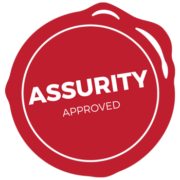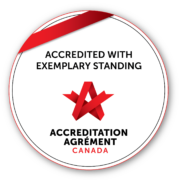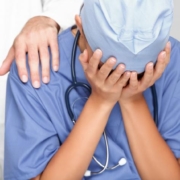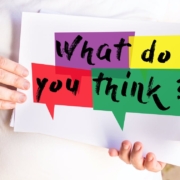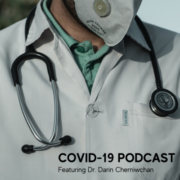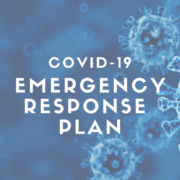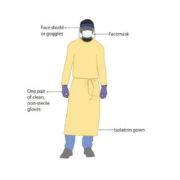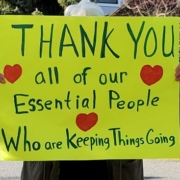Share Your Thoughts and Questions with the CEO
/in NewsPODCAST: COVID-19 and Faith: Why Some People and Not Others?
/in Coronavirus, NewsPodcast: COVID-19 and FAITH – Personal Protective Equipment
/in Coronavirus, NewsApril 7, 2020 – Menno Place COVID-19 Emergency Reponse Plan
/in Coronavirus, News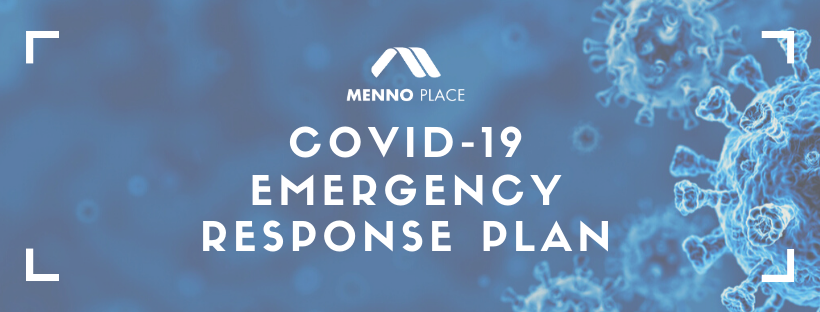
April 7, 2020
Menno Place COVID-19 Emergency Response Plan is created by the COVID-19 Emergency Response Team:
COVID-19 EMERGENCY RESPONSE TEAM
Karen Baillie, CEO; Kathrin McMath, EDFO; Cyndy Gabriel, DOC; Kim Cantwell, Mgr. Care, Infection Control Lead; Smitha Varghese, Mgr. Care; Jeanette Lee, Dir. HR; Sharon Simpson, Dir. Community Enrichment; Pearl Nucich, Executive Assistant. The COVID-19 Emergency Response Team has been in weekly consultation and planning with the Leadership Team.
The COVID-19 Emergency Response Team has been meeting to review the Menno Place Pandemic Plan and make adjustments to it for this COVID-19 Pandemic. To view the Menno Place Emergency Response – Pandemic Plan, go to Sharepoint and search “pandemic plan” – CLICK HERE
COVID-19 EMERGENCY RESPONSE PLAN
COMMUNICATIONS
- Signage across campus – coordinated by Director, Community Enrichment
- Update staff via managers, email newsletter, MennoPlaceStaff.com, Twitter.com/MennoPlaceAlert and posters at hand scanners
- Update residents via Menno TV, email and memos
- Physician communication – coordinated by Director of Care and Director, Community Enrichment
- Leadership Team – communication through COVID-19 Response Team
- Family Members & Friends – Family Members website, Family Members Facebook Page
- Volunteers – Public website
- All audiences will be notified by Twitter.com/MennoPlaceAlert if there is a positive COVID-19 case at Menno Place
STAFF
- Currently all staff are screened on beginning and end of their shift, as well as self-screening throughout, asking the questions:
-
- Do you have a fever?
- Do you have a new or worse cough?
- Do you have new or worse sneezing?
- Do you have new or worse shortness of breath?
- Do you have a new or worse sore throat?
If yes to any of these, if after 4pm, RN does swab for COVID-19.
If between 10 & 4pm, they are directed to the testing site to have swab for COVID-19 done.
- Reception desks & hand scanners, have 6 ft markings for social distancing at shift change.
- Reducing cross campus travel. Re: mail deliveries/stores deliveries, leadership movement.
- Reducing inter-building travel – staff limited to one building per shift when working at Apts
- Staff taking breaks with only those on their units – furniture removed so staff can practice 6ft social distancing
- Signage indicating immediate hand sanitizing or handwashing upon entrance at all staff entrances
- Effective week of 4/4/20, all staff to wear masks and goggles.
- Week of 03/04/20, staff limited to one-site only. Menno Apts, Home and Hospital considered one site.
- Staff to shower and change uniforms between Menno sites.
- To limit movement of staffing providing documents to RN on evenings. Staffing will do sick call-outs from home.
- Music Therapist to one unit/day.
- Decrease in personal meetings. Use of ZOOM or other virtual methods.
- More staff working from home. (Finance/SWs, etc)
- Staff permitted to cancel pre-arranged vacations in order to keep coverage
- No new vacations/LOAs at this time.
- Staffing guideline for International Travel – staff travelled internationally self-isolate and stay away from workplace for at least 14 days
- Living in same household with someone who has tested positive for COVID-19 must self-isolate for at least 14 days
STAFF EDUCATION
- What is COVID-19?
- Hand-Hygiene – Posters, Huddle, Signage at Entrance, biometric hand-scanner
- SafeWork Procedure – WorkStation Cleaning Instructions
- Safework Procedure – Disinfecting Contaminated Equipment – Sharepoint
- Safework Procedure – Contaminated Laundry – Sharepoint
- PPE Usage
- Point of Care Assessment
Staff who tests Positive:
- ALL units go into outbreak mode isolation.
- Follow Public Health/MHO directions.
- Monitoring of residents and staff ongoing, including taking the temp using touchless thermometer.
- Communication – inform everyone: staff/families/residents, including the unit affected.
- Twitter.com/MennoplaceAlert for real-time updates
- SWAT clean to unit to do thorough cleaning. (all housekeeping staff on duty at the time)
RESIDENTS
- All residents are screened twice daily.
- Anyone returning from ARH are pre-screened and screened twice daily ongoing, including temp taking.
- Any new move-ins (none from community, only acute) are pre-screened and screened BID ongoing.
- Group residents activities stopped, smaller groups (providing they can maintain the 6 ft distance)
- Newspapers cancelled.
- All volunteers cancelled.
- No inter-facility transfers.
- Dining rooms are separated, residents as close as possible to 6 ft apart.
- Apartments residents meals served to their suite.
- Canada Post deliveries to be held 48 hours before delivering to residents.
Resident who tests Positive:
- As above plus:
- Needs to be managed in a private room.
- Triangle ‘ALERT’ signage on door.
- Enhanced cleaning with PPE.
- Full PPE when entering room (as per our norm)
- Caution tape on outside of door to unit.
- Dining carts wiped down after use on the unit.
- Maintenance/If essential work required, PPE on unit. All non-essential work postponed.
- Pastoral care – no access to isolated resident
- Palliative res in isolation – no family visits (a difficult decision!)
- Pick up at door to unit – laundry/stores supplies/garbage)
- No movement of staff between buildings
SUPPLIES
- Supplies and inventory being reviewed daily.
- Supplies centralized in stores as much as possible. Masks kept in nursing stations.
- Isolation carts being inspected for contents numbered and moved to central location – Menno Hospital chapel.
- Donations of goggles being received daily.
- Plan to also discuss with pharmacy at ARH
- LPNs at the Apartments to be educated on swab collection.
- Tuck cart for Apartments residents – Tena products, toilet paper, etc.
VISITORS
- Home, Hospital, Assisted Living: Visitation limited to palliative only. Families must wear PPO and be screened upon entrance and exit of buildings.
- Independent Living: Registered Visitor Program
BUILDINGS/SITE
- One primary entrance to each building.
- Increase of signage
- Hospital Conference Room – designated command post.
- Enhanced cleaning of all surfaces twice/day.
- Maintenance to wear booties at entrance and exit of unit. Garbage cans placed at entrances.
Menno Place PPE for Staff – 04/07/20
/in Coronavirus, NewsSince January, Menno Place has been seeking to obtain PPE for our staff in preparation for increased need in the event of the COVID-19 pandemic coming to Abbotsford. Thank you to the team in Stores who have worked creatively and relentlessly to obtain the supplies that we currently have on hand. We use PPE when we have an outbreak. Outbreaks have depleted our supplies. PPE is difficult to obtain and much of it is on backorder until the summer unless supply chains change.
What PPE (Personal Protective Equipment) is Menno Place providing?
- One Pair Goggles – Each healthcare worker will receive one pair of goggles to keep as their own. They are responsible to label, sanitize and store the goggles. They are responsible to either lock them in the locker or bring them home after each shift. The goggles must be washed with soap and water prior to coming to the unit. They may be washed in a housekeeping sink at Menno Place. Soap will remove coronavirus on the goggles. Staff may not share these goggles. There are no replacements at ths time if the goggles are lost or broken.
- One Surgical Mask -This mask belongs to you. You are to extend the use of it by wearing it for multiple shifts unless it is visibly soiled or damaged. When not in use, fold the mask so that the white side (toward your mouth) is the inside of the folded mask. Store in a safe location for further use. If your mask is visibly soiled or damaged, see your manager to discuss replacement. Use sparingly. We have a very limited supply.
At this time, you may wear a non-medical mask of your own unless working on a unit that is on outbreak.
This will change rapidly if we are given direction from Public Health or have changes in our supply availability or have a COVID-19 positive case.
Why are we providing PPE to staff at this time?
On March 29th, the BC Ministry of Health gave all health authorities the direction to immediately review, activate and operationalize the Emergency Prioritization in a Pandemic: Personal Protective Equipment Allocation Framework (the PPE Framework) that was distributed March 25, 2020.
In the attached bulletin (see below), all healthcare providers were provided an alert that the province’s PPE supply is at STAGE, meaning that all PPE levels are intact but at least one item will be depleted in a matter of days.
Menno Place COVID-10 RESPONSE TEAM immediately began a full PPE risk and point of care assessment for every resident interaction. Menno Place embarked on a drive to purchase and receive Goggles which produced a significant inventory of Goggles.
The Ministry of Health direction continued to say that “all health care and support workers must extend the use of donned PPE by wearing the same PPE throughout their entire shift only changing when absolutely necessary, for example when items are damaged or visibly soiled.”
Diligent hand hygiene is required.
All health care workers must only use N95 respirator masks for aerosol generating medical procedures.
The Ministry of Health and teh PHSA Supply Chain, BC’s central, provincial purchasing and procurement organization are working to ensure tha tmedical supplies and PPE are being managed and shared across the health care system, and prioritizing distribution to ensure availability in the most critical conditions.
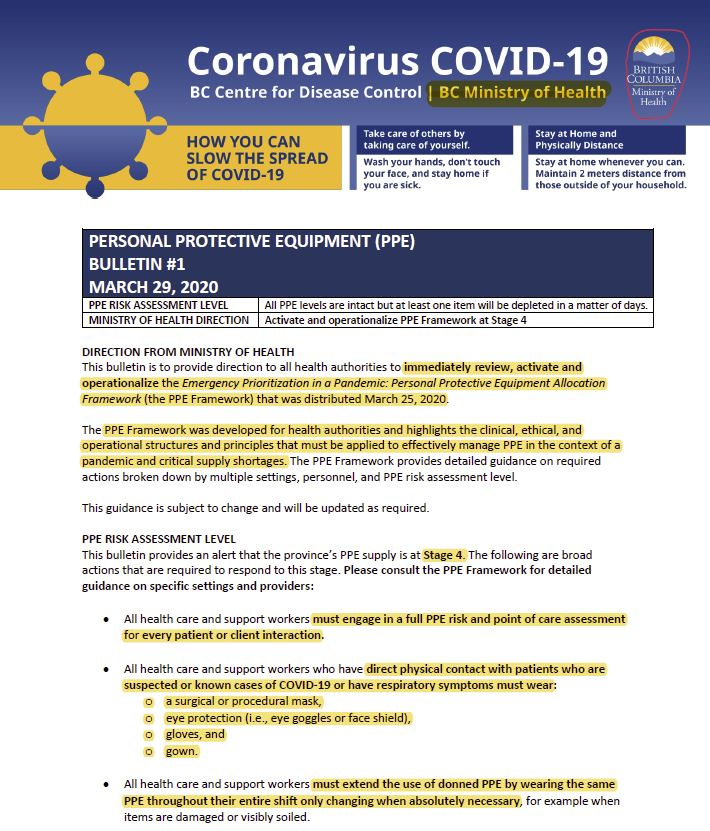
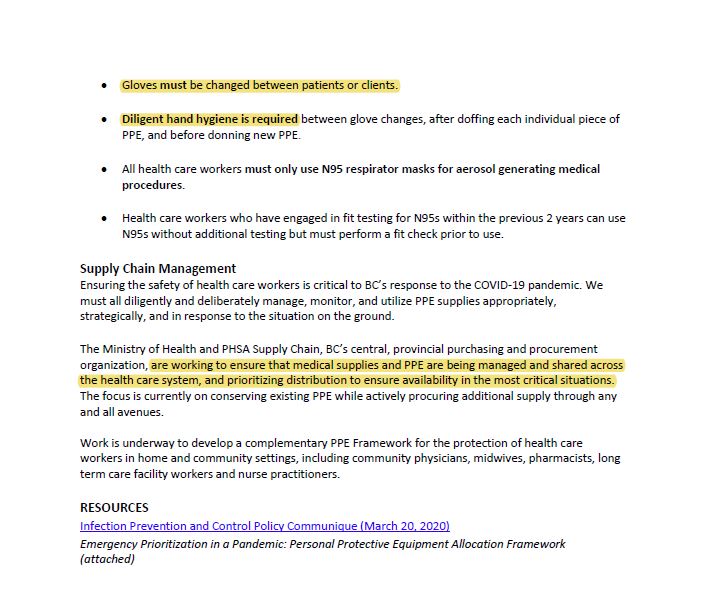
Thank you for choosing Menno Place!
/in News
THANK YOU SO MUCH FOR PICKING MENNO AS YOUR PREFERRED WORKPLACE!!!
We are anticipating that all care homes in our region will be going single site later this week. We are so happy you picked us!!!
The pizza is a token of our appreciation.
Karen L. Baillie, CEO
Profound thanks
/in NewsTo the Staff of the Menno Hospital, E1 …
Our profound thanks for all that you do for our mother, and for the other residents who live in the Menno Hospital. In this time of worry and stress over the covid 19 virus, you care for our mother as if she were part of your own family … we are profoundly grateful. You are her family when we cannot be there.
Thank you in particular to Tammy, the Nurse on Mom’s floor this evening, who phoned us just to say that Mom was doing well. Hearing this unsolicited update was so very much appreciated. Tammy’s kindness and thoughtfulness in making this call meant a lot when it is impossible for us to visit ourselves. Thank you!
The staff and administration of Menno continues to be in our thoughts and in our prayers in this difficult time.
Love, J&G
Thank-You’s Around Campus
/in NewsThe community has been expressing their thanks to the Menno Place staff in significant ways. Thanks to our amazing team for working diligently though this crisis!
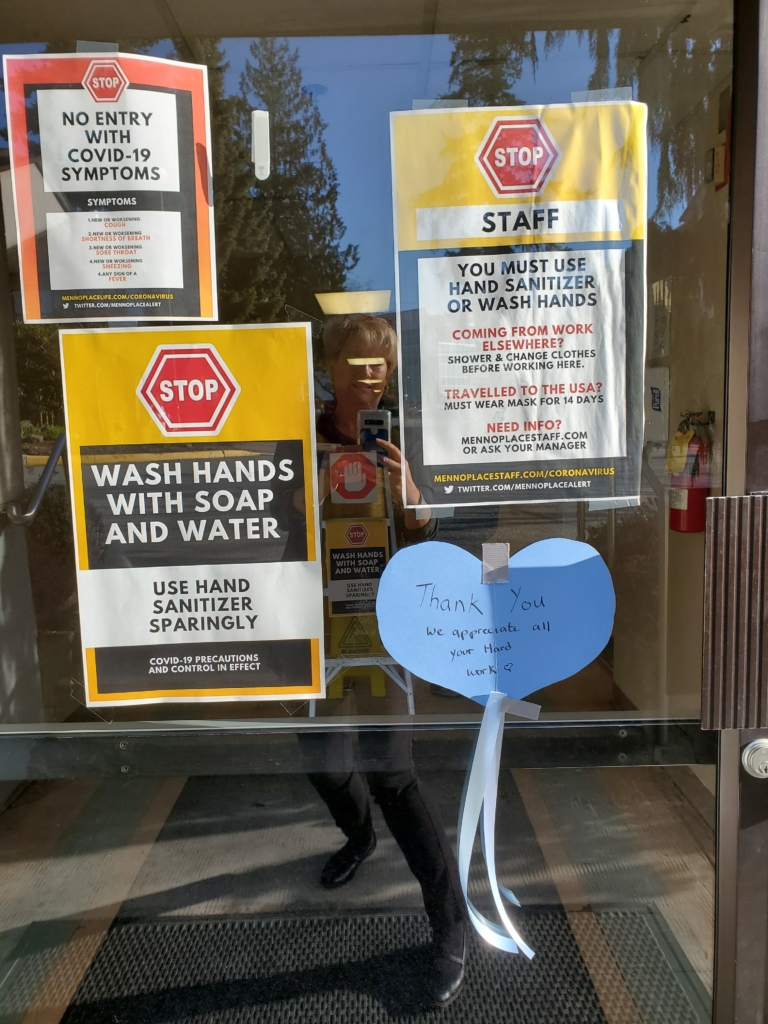
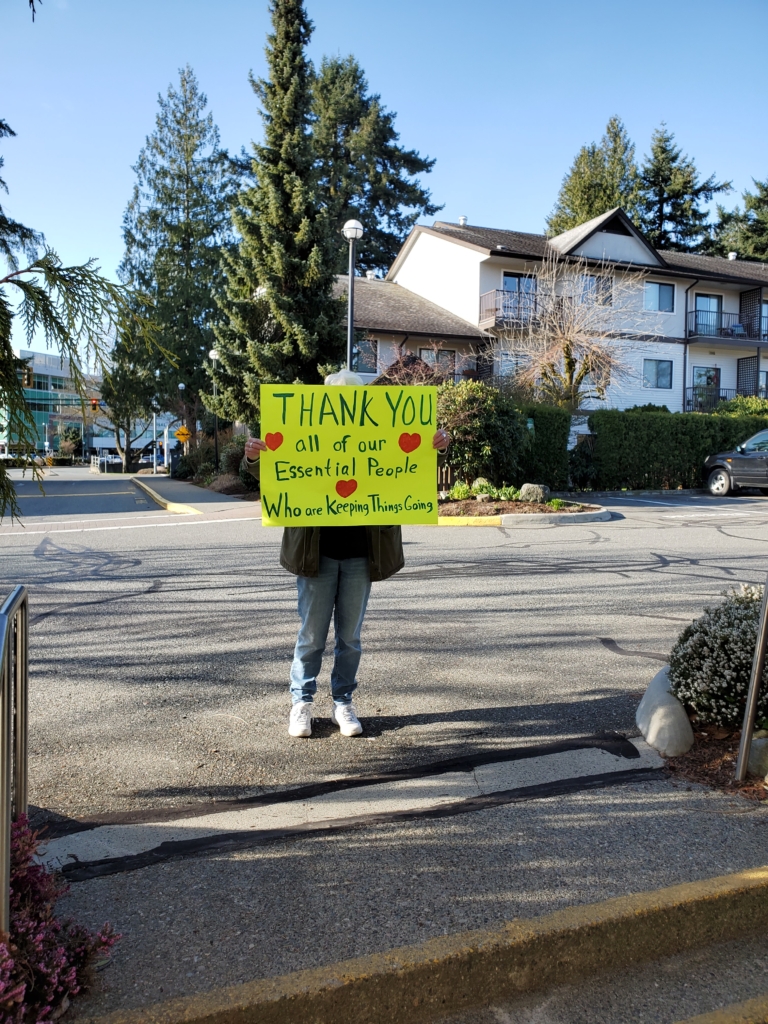
Managing Stress and Anxiety during COVID-19
/in Mental Health, News, Not Myself Today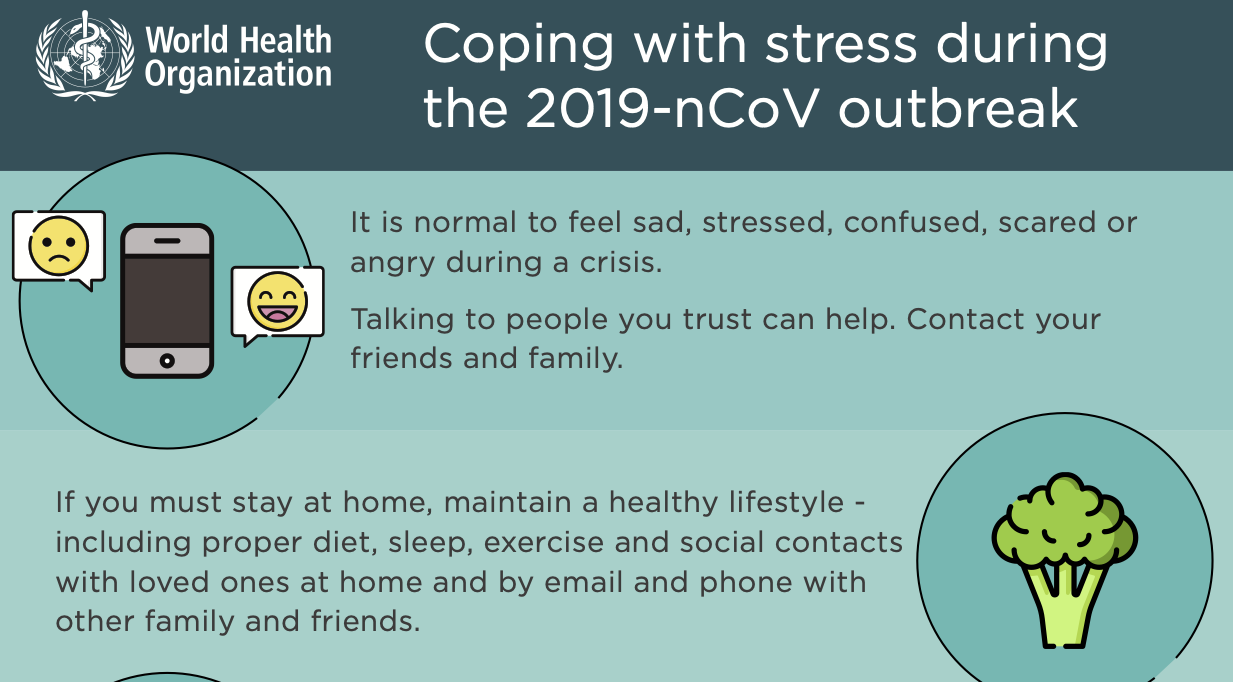
FROM: https://bccare.ca/2020/03/taking-care-of-your-mental-health-during-the-covid-19-pandemic/
On March 11th, 2020, the World Health Organization (WHO) declared the COVID-19 outbreak a pandemic. The novel virus (meaning it is a new strain that has not been previously identified in humans) is most dangerous for seniors, and people with certain chronic health conditions. By now, most British Columbians are aware of the things they should be doing to reduce the likelihood that they contract COVID-19, or spread it to others (jump to the end of this article for a refresher). Protecting your health and the health of others is very important, however there are also things you can do to protect your mental health during the COVID-19 outbreak.
Remind yourself that big emotions are to be expected in stressful situations like this one
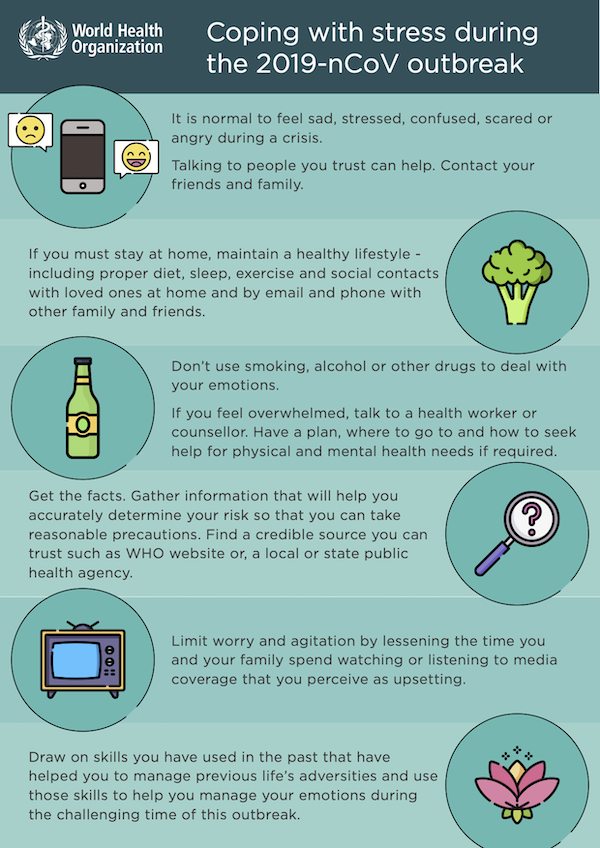
As British Columbians experience the effects of this pandemic, many of us will experience strong, or even overwhelming emotions. For caregivers, this can be compounded by pre-existing feelings of stress, grief or guilt. Consider speaking with family and friends about what you are experiencing, or contacting a caregiver helpline.
Almost all of us will experience some degree of worry as a result of COVID-19. When these feelings get unmanageable, however, they can result in panic or anxiety, inability to concentrate on work or other responsibilities, problems sleeping or excessive alcohol or drug use. If you are experiencing these challenges consider reaching out to a counsellor, or physician. You may even think about trying one of the text or phone-based counselling services, which you can access from home.
People who have had mental health, or alcohol or substance use challenges in the past, or who are currently managing a mental health condition, should take extra care during this time, and (if necessary) ensure they have access to the medications they may need if they are required to self isolate.
Make a plan
Throughout the course of the pandemic it is possible that either you, or someone you care about will be required to self isolate.
People who are caring for a senior who lives in a care home may find the thought of not being able to visit their family member to be particularly distressing. Planning in advance can help, think about how you will get information from the care home and ways you can check-in with your family member if visiting isn’t possible.
If you are required to stay home, consider following a daily routine, exercise and mediate if possible, and check-in with family and friends by phone to reduce feelings of social isolation. If you are caring for someone who lives with you, think about ways to keep them occupied during long stretches at home.
Avoid information overload
There is new information emerging on COVID-19 by the hour. While it is important to remain informed, too much information can feel overwhelming. Limit your news intake to reputable sources. If you are feeling that the news, or social media, is making you feel anxious, consider setting a time limit.
Protect yourself and others
Reducing our exposure, and the exposure of others is critical to “flattening the curve.”
- Wash your hands frequently, with hot soapy water for at least 20 seconds. If soap and water is unavailable use hand sanitizer with at least 60% alcohol.
- Don’t touch your face with unwashed hands.
- Self-isolate if you feel ill, even if you think it’s just the sniffles.
- Cover your mouth and nose with your bent elbow or tissue when you cough or sneeze. Then dispose of the used tissue immediately.
- If you feel you may have contracted the virus, follow the steps recommended by HealthLink BC.
- Practice social isolation. This means avoiding large events or gatherings, maintaining at least 1 metre (3 feet) of distance between yourself and anyone who is coughing or sneezing and not shaking hands.
- Do not stockpile medical supplies or masks, this reduces the supplies for health care providers and puts others at risk.
Resources:
https://www.who.int/emergencies/diseases/novel-coronavirus-2019/advice-for-public
https://www.who.int/docs/default-source/coronaviruse/coping-with-stress.pdf?sfvrsn=9845bc3a_2
USE OF MATERIALS
All materials available on the www.MennoPlaceStaff.com website are published for the sole purpose of keeping informed those individuals who work on the Menno Place campus. These materials may be shared with others who are also connected to the Menno Place campus in this same way. No content or material may be used or shared in any other context without the written permission of the Menno Place Director who oversees communications.
